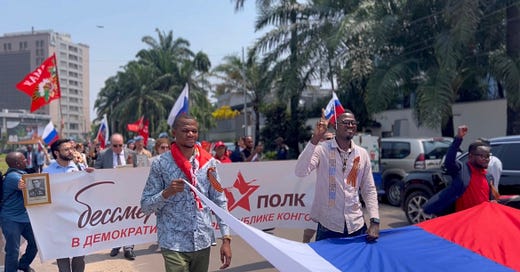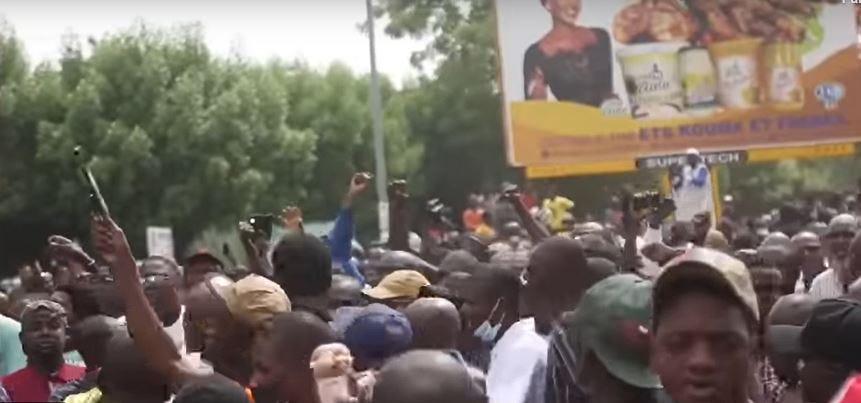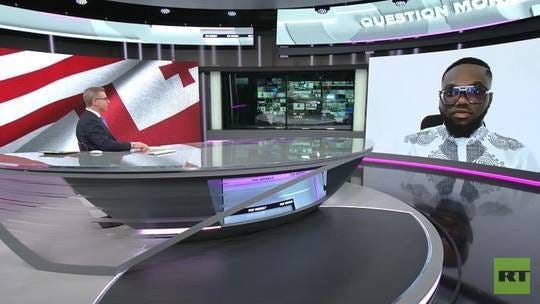The Week’s Top Five Links
Yves Plumey Bobo, “‘Dead for Russia’: Cameroon confronts the scourge of those ‘conscripted’ into the Russian army”, Jeune Afrique, 30 April 2025 [paywall, in French].
“Thousands rally in Burkina Faso in support of military junta following alleged coup attempt”, Associated Press, 30 April 2025.
Ryan Bauer et al, “Russian Mercenary and Paramilitary Groups in Africa”, RAND Corp, 1 May 2025.
“West Africa’s Togo Says Ukraine Captured Togolese Fighting Alongside Russian Forces”, The Kyiv Post, 2 May 2025.
“Cracks appear in Traoré’s YouTube persona”, Africa Confidential, 2 May 2025.
Cover photo: Russia’s cult of the Soviet Union’s fight in the Second World War often involves rallies organised by Russian embassies across the world. This week saw one taking place in Kinshasa, DRC, which, according to the local Russian Embassy included ‘the management and staff of the Russian Embassy, compatriots living in Congo, citizens of Belarus, the head of the diplomatic mission of Serbia, Russian and Chadian police officers from MONUSCO’ (quote source; image source).
The Week in Analysis
Alabuga Stop. This week, Interpol launched an investigation targeting Russia’s human trafficking/entrapment operations in Africa. This specifically concerns the Alabuga Start programme, which trafficked hundreds of individuals to work in Russian arms factories in ‘slave’-like conditions. Journalists across the continent have already covered the programme and its purpose, as well as the dilemmas faced by the victims. As Ethiopia’s The Reporter reported in February:
Without clear regulations or international oversight, programs like Alabuga Start exist in a grey zone, where the promise of opportunity may ultimately serve as a cover for something far more troubling.
As Ethiopia continues to struggle with high youth unemployment, young women like Senait and Kalkidan [not their real names — Ivan] remain caught in a difficult choice—stay in uncertainty or take a chance on a program shrouded in secrecy.
Indeed, Russia specifically targets young women, going as far as to go to orphanages to get people to feed its war machine. The Interpol investigation was launched at Botswana’s request, and it should further raise awareness across the world about Russia’s human trafficking operations to feed its war machine. Governments should break the silence and crack down on these operations, and raise awareness for people to avoid the trap. By the way, when you search online ‘Alabuga Start’, you will find potentially dozens of ‘news’ websites with promotional materials of the operation, written in English, French, Spanish and potentially other languages, too. Any website that publicised the programme should take those materials down.
Russia, through the Wagner Group et al, has astroturfed and amplified friendly rallies across Africa for years now.
Horn engagements. On 27 April, Russia’s representative to Africa and the Middle East, Mikhail Bogdanov, visited Mogadishu to meet with Somali President Hassan Sheikh and Foreign Minister Ahmed Moallim Fiki. According to the Russian press release, the meeting related to Somalia’s upcoming membership in the United Nations Security Council (2025/2026). Reportedly, Bogdanov invited President Sheikh to the Russia-Arab World Summit. On the next day, Russian Foreign Minister Sergey Lavrov met with Gedion Timothewos, his Ethiopian counterpart, at the BRICS Council of Foreign Ministers in Rio de Janeiro. The Russian press release suggests the discussion included the topic of security in the Horn of Africa. The Ethiopian press release on the BRICS meeting mentioned but did not delve into the Timothewos-Lavrov meeting.
Detail: there was no joint BRICS communique in this year’s ministerial summit.
Sahel dictatorships. Since the 2021 coup d’etat, Bamako had maintained the narrative that the junta’s authority would be temporary and that it was working towards a return to civilian rule. This game came to an end this week, as Mali junta leader Assimi Goita took the next step in his takeover of the country’s institutions. On DATE, the junta-controlled ‘national dialogue’ endorsed a resolution calling for the end of Mali’s political parties and Assimi Goita to become president for 5 years, without elections. Back in March, neighbouring Niger went through a similar process, as their equivalent junta-controlled process called for an end of political parties in the country and the takeover of the country by junta leader Abdourahamane Tchiani. Russian state-controlled media have been mostly quiet or reported on the takeover in a matter-of-fact style, focusing on the ‘endorsement’ of Goita by the junta-controlled national dialogue. International media, meanwhile, have reported on the rising protests in Bamako, as political parties express their opposition to the takeover. These are yet to receive attention from Russian propagandists.
3rd of May protests in Bamako (source).
Of course, it is easy to imagine how Russian media will cover the protests. Back in April, Russia-state-controlled media African Initiative had made efforts to dismiss protests that gathered in Central African Republic against the constitutional reforms that would prolong the rule of President Faustin Archange Touadera. The Russian media went as far as releasing drone photos of the crowds, claiming their size is not representative of the population. Moreover, African Initiative also published an article claiming that the protests were astroturfed and paid for by France. This is all projection, as Russia, through the Wagner Group et al, has astroturfed and amplified friendly rallies across Africa for years now.
Unavoidable player? As RAM readers are aware, one effect of Russia’s presence in the Sahel is Moscow’s rising profile for local actors outside of Burkina Faso, Mali and Niger (the AES). RAM has covered op-eds, declarations and diplomatic visits to back it up. This week, an additional point can be added. The esteemed Institute of Security Studies (ISS), the leading African think tank on international security, published on 28 April a policy brief on how to unlock the diplomatic crisis between Algeria and the AES countries (RAM no. 23), suggesting the need to involve Russia in the mediation process. In particular, the authors of the brief (Hassane Koné, Fahiraman Rodrigue Koné and Djiby Sow) suggest the African Union could informally approach Russia, for it to facilitate contacts between Algeria and the AES. Coming from this team and the ISS, the recommendation must be taken seriously, with the awareness that Moscow will always be self-serving, including in relations to its seemingly close Algerian and AES partners. If it can benefit from the Algeria-AES acrimony, Moscow will do nothing to mitigate it.
Narrative nuances. The President of the Republic of Congo, Denis Sassou-Nguesso, held a long interview with African Initiative, published online on 28 April. A notable moment was when suspected FSB officer and editor Artem Kureyev asked Sassou-Nguesso about the role of Africa in ‘building a multipolar world’. Sassou-Nguesso provided an answer threading the needle by appealing to the Russian messianic narrative on building world Socialism the multipolar world without using the word ‘multipolar’. The moment is illustrative as it hints at the tensions between Russia’s long-term partners (such as Republic of Congo) and Moscow’s Africa narrative.
Those darn NGOs. On 28 April, Russia's state-controlled media RT broadcast a segment on ‘Western’ NGOs, including in Africa. While there is something to be said about the limits of international aid (‘dead aid’) and of how NGOs work on the continent today, the goal of the emission was different. The RT show was joined by fellow Substack author, Nigerian journalist David Hundeyin, who spread the narrative of US-orchestrated ‘colour revolutions’ through ‘Western’ NGOs. The topic of the emission was Georgia, where the pro-Russian authoritarian government continues to take away the rights of Georgian citizens and dismantle the democratic institutions of the country. Hundeyin’s role in the emission was to connect Russia’s narrative against Georgian democracy with accusations of US meddling across Africa. According to this narrative, the US is intent on controlling the continent’s natural resources through organisations such as USAID and its ‘Western’ NGOs.
Hundeyin speaking to RT (source).
Of course, USAID spent most of its budget in Africa on health, with a large portion going to fighting the HIV/AIDS epidemic. The shutdown of most USAID programmes has left the governments of the continent and international donors scrambling to replace that support. While much hype has gone around Russia supplanting US aid to the continent, Moscow has tended to neglect the HIV/AIDS epidemic at home, in part because that would involve ‘woke endeavours’ [the RT phrase] such as sex-ed. When speaking about ‘Western’ NGOs in Africa, Hundeyin spoke specifically about Kenya and Ghana, claiming that the economy in those countries is damaged by the NGOs. The RT propagandist host responded to Hundeyin’s claims with a very genuine ‘wow’. In the past, Hundeyin has been found to mislead his readers by making blunt comparisons between European colonisation of Africa and US policy towards the continent.
Learn more about the challenges of the CSO/NGO sector in Africa here and here.
Thank you for reading the Russia-Africa Monitor! Please leave a comment with your thoughts about the week’s stories.



